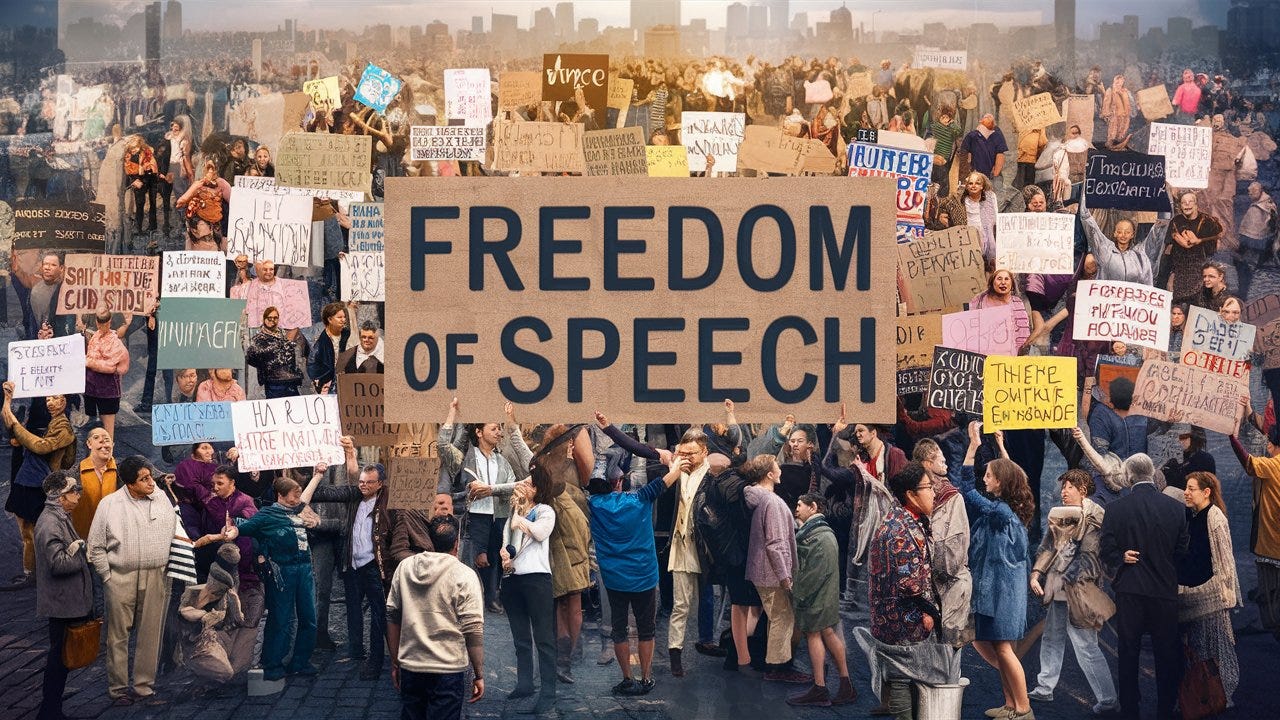Campus Protests and the Erosion of Free Speech Principles
As protests sweep across American campuses, university administrators and political leaders are displaying a concerning disregard for the fundamental principles of free speech.
The Story:
The regulations governing protests on American campuses vary widely and can be challenging to enforce effectively. Public universities are bound by the First Amendment, which protects most forms of speech and expressive activity, regardless of how objectionable the content may be. This means that public institutions cannot simply silence or censor student protesters based on the nature of their views.
However, universities can still impose reasonable restrictions on the "time, place, and manner" of protests to ensure that normal campus operations, such as classes, can continue uninterrupted. Private universities, while not legally bound by the First Amendment, often adopt similar principles of free expression in their policies.
Nevertheless, all colleges can restrict protests that disrupt the campus, such as blocking buildings, interrupting lectures, or creating excessive noise. Universities must also adhere to federal civil rights laws, such as Title VI, which prohibit discrimination on the basis of race, color, or national origin. This has led to lawsuits from Jewish students alleging a hostile environment on campus due to incidents of anti-Semitic abuse.
University administrators have faced criticism for enforcing their protest policies unevenly. In recent years, they have often accommodated student demands to limit speech deemed racist, sexist, or anti-transgender, while appearing less responsive to the concerns of Jewish students. Some critics argue that this inconsistency reflects a political bias, where certain forms of controversial speech are deemed more acceptable than others.
Attempts by university leaders to crack down on protests have also been met with backlash. Heavy-handed police interventions, such as the use of riot gear and mass arrests, have been criticized for infringing on students' free speech rights and often backfiring by further galvanizing the protesters.
The View:
The ongoing tensions surrounding protests on American college campuses expose a concerning disconnect between the lofty rhetoric of free speech and the reality of how it is being upheld in practice. Too many leaders, both in government and university administration, are failing to consistently apply the principles of the First Amendment, betraying the very values they claim to champion.
The crackdowns witnessed across the country, with authorities deploying riot police and making mass arrests of students engaged in peaceful protest, are a glaring violation of the fundamental right to free expression. These heavy-handed tactics, often seemingly motivated by the political nature of the protesters' views, undermine the core tenets of a free and open society.
An effective approach, instead, would be to clearly communicate the rules, provide opportunities for protesters to modify their tactics, and only resort to punitive measures against those who persistently violate the policies.
It is deeply troubling to see such authoritarian responses from those in positions of power, who should be steadfastly defending the rights of students to voice their beliefs, no matter how unpopular or controversial they may be. The selective enforcement of campus protest policies, where certain forms of speech are deemed unacceptable while others are accommodated, is a clear betrayal of the principles of equality and non-discrimination.
University leaders must demonstrate a true commitment to upholding the free exchange of ideas, even when the content of that speech may be objectionable to some. Consistency and impartiality are essential in maintaining the integrity of these institutions as bastions of intellectual discourse and open dialogue. As students across the nation watch these events unfold, they are learning a dangerous lesson: that the supposed champions of free speech are, in fact, willing to sacrifice those rights when it suits their interests.
This is a concerning development that undermines the very foundations of a democratic society, where the freedom to dissent and challenge prevailing narratives is a cornerstone of progress and social advancement. The time has come for those in positions of authority to heed the lessons of history and truly embrace the spirit of the First Amendment.
They must demonstrate, through their actions and policies, a genuine commitment to protecting the right of all individuals to express their views, no matter how unpopular or provocative they may be.
Anything less is a betrayal of the principles they claim to uphold, and a disservice to the next generation of citizens who will inherit the consequences of this failure.
TLDR:
Public universities are bound by the First Amendment, which protects most forms of speech and expression, with limited exceptions. Private universities generally uphold similar principles.
However, universities often impose restrictions on the "time, place, and manner" of protests to maintain campus operations, which can lead to uneven enforcement and accusations of bias.
Recent crackdowns on pro-Palestinian protests, including mass arrests and heavy-handed police intervention, have raised concerns about a growing disregard for free speech rights, even among those who claim to champion them.
Elected officials, like the Texas governor, have openly called for the expulsion of students engaged in "hate-filled, antisemitic" protests, despite the lack of a clear legal exception for such speech.
University administrators, such as the Columbia University president, have also been accused of sacrificing free expression to appease external pressure, undermining their own institutional commitments to academic freedom.
The inconsistent and disproportionate responses to campus protests have led students to question the sincerity of those in positions of power when they profess to value free speech.
Upholding the principles of free speech, even for unpopular or offensive speech, is a crucial test for leaders in government and academia, and the current failure to do so sets a dangerous precedent.
Insights From:
Those Who Preach Free Speech Need to Practice It - The Atlantic
What are the rules governing protests on American campuses? - The Economist




